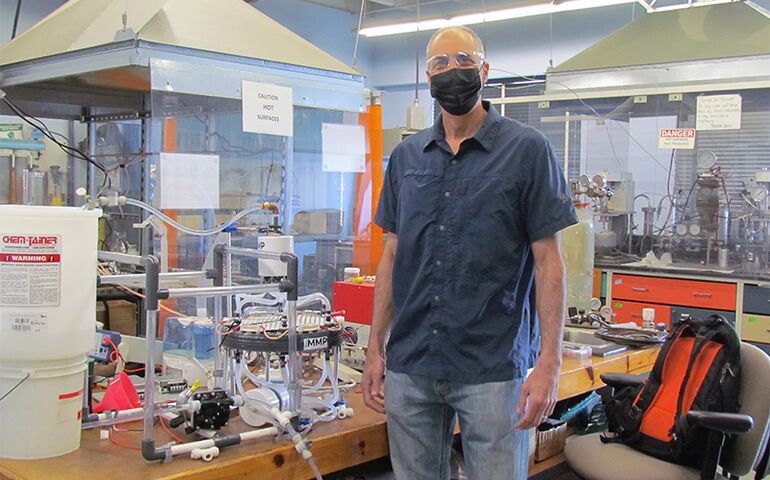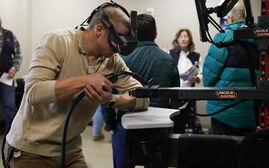UMaine prof looks to boost local production of environmentally friendly disinfectant
 Courtesy / University of Maine
University of Maine professor William DeSisto is refining the product and equipment needed for small-scale production of an environmentally friendly disinfectant. He’s seen here with the basic rig.
Courtesy / University of Maine
University of Maine professor William DeSisto is refining the product and equipment needed for small-scale production of an environmentally friendly disinfectant. He’s seen here with the basic rig.
Using only salt, water and electricity, a group of Mainers are working to create a disinfectant that could be the basis for a new, environmentally friendly product that fights COVID-19.
University of Maine professor of chemical and biomedical engineering William DeSisto is teaming with Biddeford-based Maine Manufacturing Partners and others to refine the technology for making a substance called hypochlorous acid.
It's safe, nontoxic and has been identified by the U.S. Environmental Protection Agency as an effective disinfectant against SARS-CoV-2, the virus causing COVID, according to a news release.
DeSisto was recently awarded $374,752 by the U.S. Economic Development Administration to pursue to the project.
In addition to surface disinfection, hypochlorous acid can be used to fog building interiors to capture and remove suspended aerosolized virus particles. The award utilizes CARES Act funding for economic development assistance programs to help communities prevent, prepare for and respond to coronavirus.
“Because of its effectiveness at low concentration and its nontoxicity, hypochlorous acid has great potential,” DeSisto said in the release. “It’s a versatile product that can be used in a wide range of applications — medical settings, hospitality, agriculture, even wastewater treatment — but it has a relatively short shelf life, hence the value of developing local production infrastructure."
Creating capacity to produce hypochlorous acid in Maine could expand market opportunities for the disinfectant and reduce risk from supply chain interruptions, particularly for rural areas, he added.
The base technology to produce hypochlorous acid has been around for some time, and DeSisto is researching new production concepts aimed at improving reliability and economics for local production.
Hypochlorous acid, which is also naturally made in the human body, is extremely efficient at killing viruses and bacteria, DeSisto told Mainebiz.
A couple of aspects make it environmentally friendly. One is that it’s not caustic in the way bleach is. And because it’s more effective than bleach, it can be used at lower concentrations.
DeSisto learned about the substance through a friend who is a dentist and uses it to fog his office and equipment between patients. But the fogging product was pretty expensive.
“That got me thinking about how it’s made,” he said.
The product lends itself to small-scale, local production because it’s easy to make and yet has a short shelf life of about two weeks, he said.
“You can’t make a giant tanker full and hold it for a while,” he said. “You need to make it and use it.”
The production method is based on electrolysis — that is, a direct current is used to initiate the chemical reaction. DeSisto is exploring a variety of approaches. The grant is going toward refining the product and the equipment.
“Hopefully we can get traction on this and make some headway,” he said.
When hospitals were facing urgent shortages of hand sanitizer early in 2020, DeSisto was part of the team that established UMaine’s hand sanitizer production operation which, with the help of statewide partners, ultimately supplied more than 3,000 gallons of hand sanitizer to Maine health care facilities.
“That experience taught me a lot about the vulnerability of the medical supply chain and how important local production can be,” he said.













0 Comments